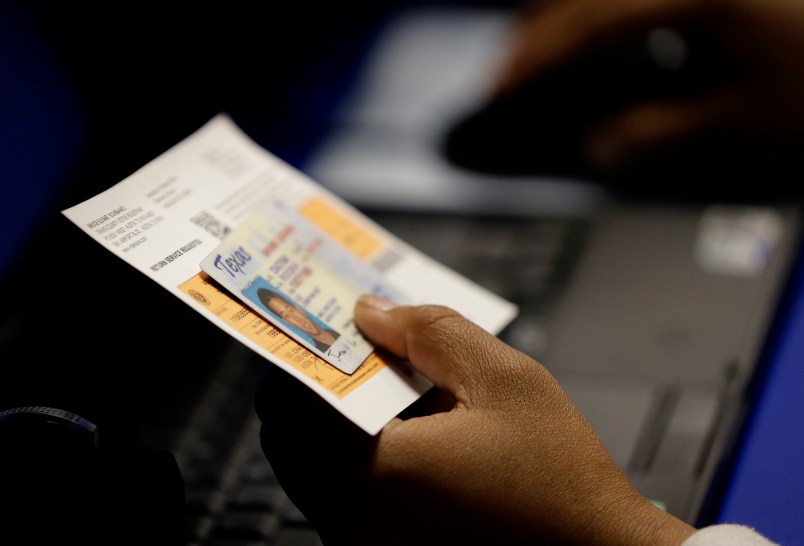A number of poll places in Texas are disseminating inaccurate and out-dated information about the state’s voter ID law, which was softened by court order after an appeals court ruled it discriminatory, The Texas Tribune reported Tuesday.
Voters and voting rights advocates spotted some polling places advertising old posters spelling out the state’s ID requirement that did not explain the newly imposed carve-out for voters who faced a reasonable impediments in obtaining the required ID, the Tribune reported. Additionally, some voters heard poll workers telling those waiting in line to vote to get out the required IDs without mentioning the court-approved exemption, the Tribune said.
“This is a situation where the Secretary of State produced [updated] materials, and you can find them online,” Nina Perales, the vice president of litigation for the Mexican American Legal Defense and Educational Fund, one of the groups that sued Texas over the law, told the Texas Tribune. “The idea that polling place supply boxes were being filled with the wrong posters is so incredibly frustrating for people who have been working on this issue for years.”
The confusion comes after Texas was dragged back into court for promoting educational materials with harsher language than what the court had approved in an agreement among the parties. The state’s 2011 voter ID law was found in July by the full 5th U.S. Circuit Court of Appeals to have the effect of discriminating against minorities. Under the court-approved agreement that followed, Texas now must allow non-ID holders to vote if they show a supporting form of identification — like a bank statement or a utility bill — and sign an affidavit saying they had a reasonable impediment in obtaining the ID required by the 2011 law.
According to the Texas Tribune report, at least a dozen poll places in Texas’ Bexar County were found hanging inaccurate posters that did not include an explanation of the exemption, which some poll workers in that county and elsewhere also failed to mention when preparing the people waiting in line to vote.
One Houston attorney recounted on Facebook his confrontation with a poll worker at a voting site who was not explaining to voters the option for non-ID holders. An election-site judge had to intervene when the poll worker at first refused to change her routine, the attorney said, according to the Texas Tribune.
“You always want to believe that these are merely errors that could be fixed with better training, or errors based upon inconsistent information,” Scott Rothenberg, the attorney, said. “You always hope that it is not is an effort to disenfranchise certain voters.”
The Bexar County clerk’s office told the Texas Tribune that the old posters had been replaced with ones with accurate information, though Perales said that her group was still finding inaccurate posters at poll sites.
Other elections officials denied any malicious intent in the poll workers’ failure to educate voters about the exemption.
“Because of the high volume of voters, they are probably unwittingly not being completely accurate,” said Hector DeLeon, a spokesman for the clerk in Harris County, which includes Houston.







Excellent. Now add a flyer to all of the Texas Polling stations stating that Trump Supporters are voting on November 28th.
But you know it is, so why do we keep pretending, especially in this particular election and in this particular state?
Jail every single person involved. Make them convicted felons who can’t vote, or own guns. Hit them where it hurts most.
On account of him ‘feeding the dogs’ that were lurking outside his ‘house’, I’d like to ‘thank’ John Roberts for creating this opportunity.
Good job, John, good job.
These kinds of dumb shenanigans passed muster when Texas was a reliably red state, but now that demographics have put it on a course to purple the good ol’ boys will have to get cleverer. Considering the intellectual heft of those they’ve sent to represent them in the House (Farenthold and Gohmert, among others), that’ll be tough.